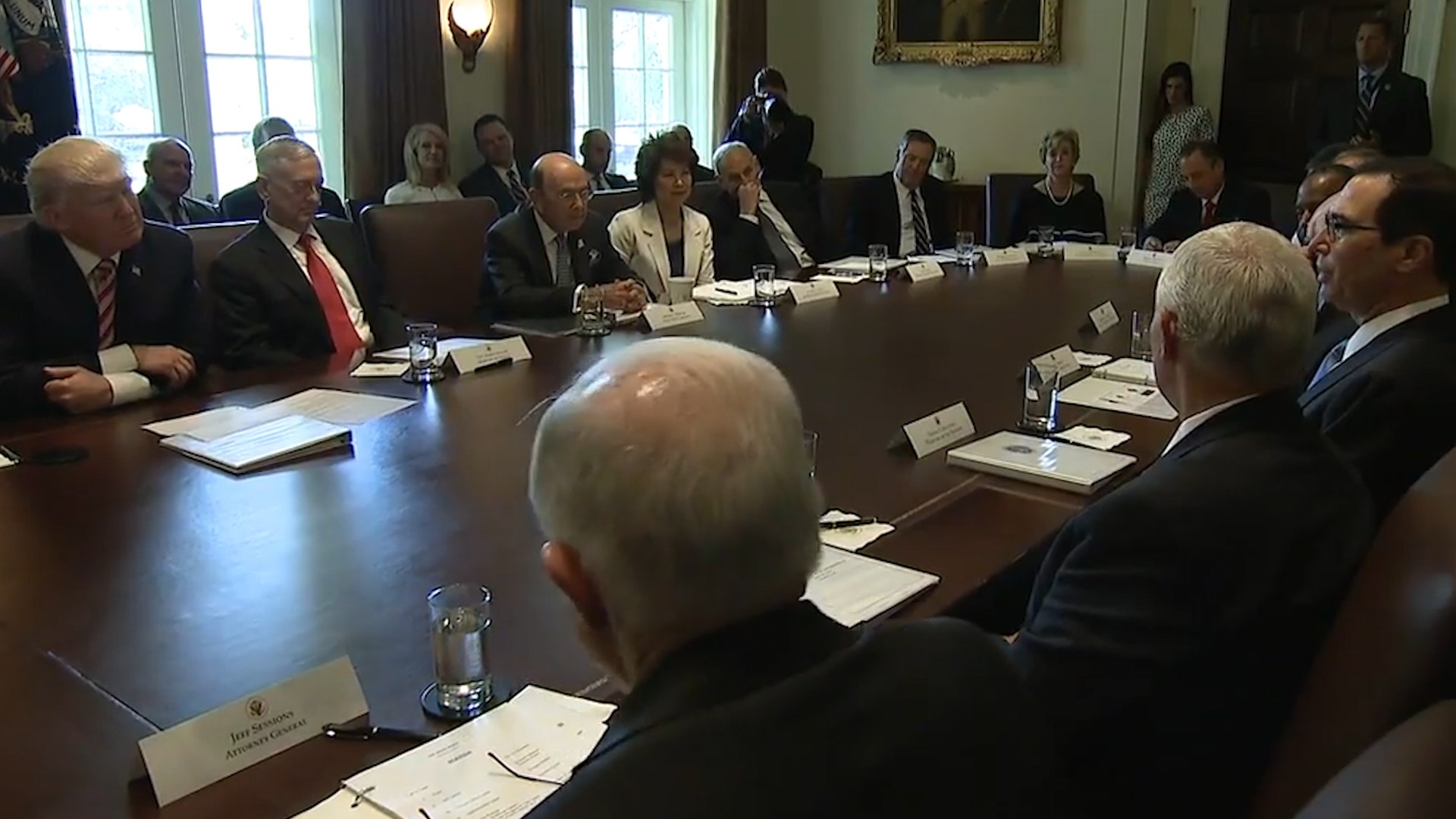Left: Jeff Sessions; right: Donald Trump. Photos by Alex Wong/Getty Images; right
The wad of media reports, official testimony, and silly gossip known these days as the "Russia scandal" continues to roll around DC like a tumbleweed of trash, rattling the foundations of the Trump administration and coating everyone associated with the president in a thin layer of disrepute. But actionable specifics have been hard to come by. Since investigations into the Russian hacking that influenced America's last election remain ongoing, there aren't yet—and may never be—actual legal charges in this saga. So far, barely anything we know about Donald Trump rises to the level of a plausible criminal allegation, even if he has committed impeachable offenses in a boorish attempt at damage control.At this point, the most important question to be asked isn't even about the hacking, the Russians, or whether Attorney General Jeff Sessions had some sort of contact with by Russian ambassador Sergey Kislyak at the Mayflower Hotel. It's a simple question, and it should be simple to answer: Why was former FBI director James Comey fired by Trump?Initially, the White House cited a letter written by Deputy Attorney General Rod Rosenstein accusing Comey of mishandling the investigation into Hillary Clinton's emails—an accusation Democrats began making during last year's campaign from hell. The administration also claimed that FBI agents didn't like Comey, which was disputed in several news reports. (Comey referred to allegations of rank-and-file disgruntlement as "lies" when testifying under oath last week.)Then, just days after Comey's ouster, Trump told NBC's Lester Holt that he actually made up his mind before that Rosenstein letter. "When I decided to just do it, I said to myself, I said you know, this Russia thing with Trump and Russia is a made-up story, it's an excuse by the Democrats for having lost an election that they should have won," is how the president put it. So it wasn't exactly a bombshell last week when Comey said he thought he had been fired because of the Russia investigation.
Watch Cabinet members praise Trump at a strange televised meeting:
On Tuesday, when Sessions took his own turn in front of the Senate Intelligence Committee, it was only natural to assume he might shed some light on Comey's firing. At the very least, he'd be able to articulate a plausible explanation for his ostensibly independent subordinate being abruptly fired in the middle of an investigation into potential ties between the Trump campaign and Russia, right?Well, not exactly. During his testimony, Sessions stuck stubbornly to the story that he and Rosenstein agreed—months before Comey's firing—that the man wasn't right for the job. (Sessions said he didn't have a conversation with Comey about the director's allegedly poor performance.) When California Democrat Diane Feinstein pressed Sessions about what the point of Rosenstein's long recommendation to ax Comey was if Trump's mind was made up already, Sessions basically shrugged. "I will have to let [Trump's] words speak for himself. I'm not sure what was in his mind explicitly when we talked to him."Beyond the letter, though, did Sessions have any conversations with Trump about Comey's firing? "I'm not able to discuss with you or confirm or deny the nature of private conversations that I may have had with the president on this subject or others," he said.When Rhode Island Democrat Jack Reed asked how Sessions went from praising Comey's handling of the Clinton investigation—which Sessions did on FOX News during the campaign—to wanting to fire him over the matter, Sessions said basically that he had (rather conveniently) changed his mind.Reed went on: Did Sessions feel "misled" when Trump said the recommendation from Rosenstein—which Sessions endorsed—hadn't mattered? "I'm not able to characterize that fact… I wouldn't try to comment on that," the attorney general replied.Sessions should feel misled, of course. If Comey was fired over the Russia investigation, it looks shady to say the least that the attorney general who recused himself from that investigation was part of that decision. (Even if Comey was fired because of decisions he made during the campaign, it can be argued that Sessions shouldn't have been involved, since he originally recused himself from "any matters related in any way to the campaigns for President of the United States.")But more important, the public should feel misled. Whatever else is happening in America right now, the Trump administration refuses to lay out its reasons for firing the most powerful and respected law enforcement official in the country. Every explanation offered so far either smells of hypocrisy (or outright lies) or points to Trump impulsively firing a man investigating his associates. Either way, that's a scandal."We might need to ask some additional questions as we go a little further down the investigation," Intelligence Committee chairman Richard Burr noted as the Sessions hearing adjourned.No shit.Follow Harry Cheadle on Twitter.
Advertisement
Watch Cabinet members praise Trump at a strange televised meeting:

On Tuesday, when Sessions took his own turn in front of the Senate Intelligence Committee, it was only natural to assume he might shed some light on Comey's firing. At the very least, he'd be able to articulate a plausible explanation for his ostensibly independent subordinate being abruptly fired in the middle of an investigation into potential ties between the Trump campaign and Russia, right?
Advertisement
